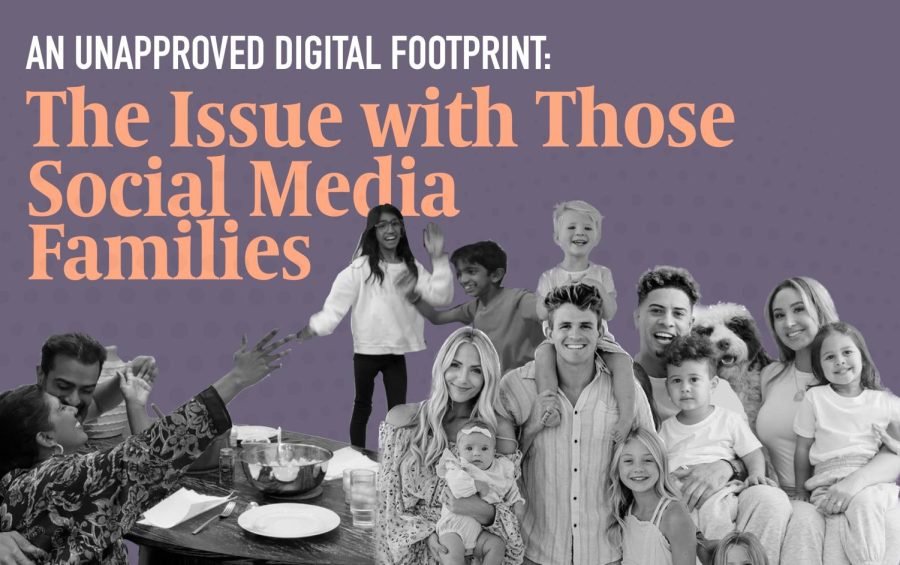Why I Won’t Watch Family Channels: An Unapproved Digital Footprint
Any social media user has likely come across family channels in their feed, such as the LaBrant Fam, the ACE Family and Daily Bumps, to name a few. At first glance, the accounts can appear wholesome and entertaining; after all, who wouldn’t be intrigued by a cute video of a toddler getting a puppy? However, family channels have proven to be deeply problematic, as they frequently result in the exploitation of children at the expense of their privacy.
Monetized family channels, in which parents post videos of their children and receive compensation from ads or sponsorships, are a relatively new phenomenon that began in the 2010s. As such, very few children who became the face of their parent’s social media accounts — as well as the source of their income, for that matter — have turned 18.
This relative lack of perspective from child influencers has allowed family channels to remain in a moral gray area. Several childhood celebrities, such as Jeanette McCurdy and Taylor Mumsen, have been vocal about their abnormal childhoods and strained relationships with their parents as a result of a childhood spent in the spotlight. However, seeing as most child influencers are minors, they are inhibited in terms of seeking legal action or speaking out against potential abuses. Therefore, millions of viewers remain blissfully ignorant of childhood exploitation when they click the subscribe, follow or like buttons on family channels.
Firstly, it is apparent from the amount of content displayed on social media platforms that child influencers are overworked and underpaid. Because family channels are centered around the idea of “authenticity” and capturing everyday moments, children of social media influencers have no separation between their work and their life. Once children enter an environment where a camera is present, they essentially resign themselves to content creation, even without their consent.
Social media is unique in its lack of regulation for minors. Child actors, for example, are protected by labor laws that limit their amount of working hours per week, as well as the Coogan laws that mandate at least 15% of minors’ earnings be set aside in a blocked trust account. However, such laws are not currently applicable to social media, which creates a loophole for parents to overwork their children, for profit, without repercussions.
Additionally, family channels tend to emotionally exploit children by broadcasting embarrassing moments on the Internet without the minor’s consent. Family channels gained momentum through clickbait-esque titles that disclose particularly intimate moments of children’s lives, such as bra shopping, having “the talk” and going on a first date. For adolescents, these milestones are sensitive and slightly mortifying to experience in front of even just a few family members, let alone millions of Internet strangers. While some parents claim that their children consent to be filmed, it seems unfathomable that a minor with an underdeveloped prefrontal cortex can process millions of strangers viewing their content for the foreseeable future.
Monetizing child-centered content is extremely tempting for family channels, as there is ample evidence of views skyrocketing after children are introduced to the feed. For example, the LaBrant Fam channel averages about 400,000 views per video, but their wedding video — which explicitly featured vows to their four-year-old daughter as the thumbnail and title — amassed over 50 million views. Viewers seem to be intrigued by pregnancy announcements, gender reveals and videos of toddlers, which generate significant income for family channels and allow social media to be a sustainable career for young couples.
Despite these benefits, prioritizing financial gain over a child’s safety and privacy is morally corrupt. Putting a child on the Internet inherently comes with the territory of exposing them to child predators, pedophiles and hoards of people with poor intentions when it comes to minors. Children will grow up with their most intimate moments plastered on social media for millions to see, which can affect their social, professional and romantic relationships for the rest of their lives.
This is not to say that people who start family channels are bad parents, nor that they don’t care about their children’s safety. After all, it is not mutually exclusive to care deeply for your children and simultaneously make misguided parenting decisions. However, parents and viewers alike need to rethink their relationship with family channels by recognizing the potentially ruinous effects they have on a child’s self-esteem and understanding of consent.
I myself have fallen victim to the allure of family channels, and I am guilty of watching videos that feature children who are clueless about the potential ramifications of their Internet presence. With that being said, I, as well as the broader audience of family channels, must take accountability and understand that viewing such a video signals one’s support for child exploitation. In order to claim concern for minors’ social-emotional well-being, one must make a concerted effort to avoid family channels.









